Leadership Development Plan - MGT360, Team Project, Fall 2020 Report
VerifiedAdded on 2022/09/15
|7
|1416
|31
Report
AI Summary
This report presents a leadership development plan, evaluating the student's leadership performance within a team project, specifically in the MGT360 course. The student reflects on their leadership approach, identifying the democratic leadership style as their primary method, emphasizing team member involvement and idea sharing. The report assesses the student's effectiveness, highlighting areas for improvement such as making honest decisions and treating all members equitably. It contrasts their leadership experiences with another team's, showing the impact of different leadership styles. Furthermore, the report details the student's progress in developing key leadership skills, including communication, intelligence, and self-confidence. It outlines an action plan for skill improvement and explores personal leadership philosophy, encompassing trait, behavioral, contingency, and transformational leadership theories. The report provides a comprehensive analysis of leadership principles and practical applications, supported by relevant literature and aimed at enhancing leadership capabilities.
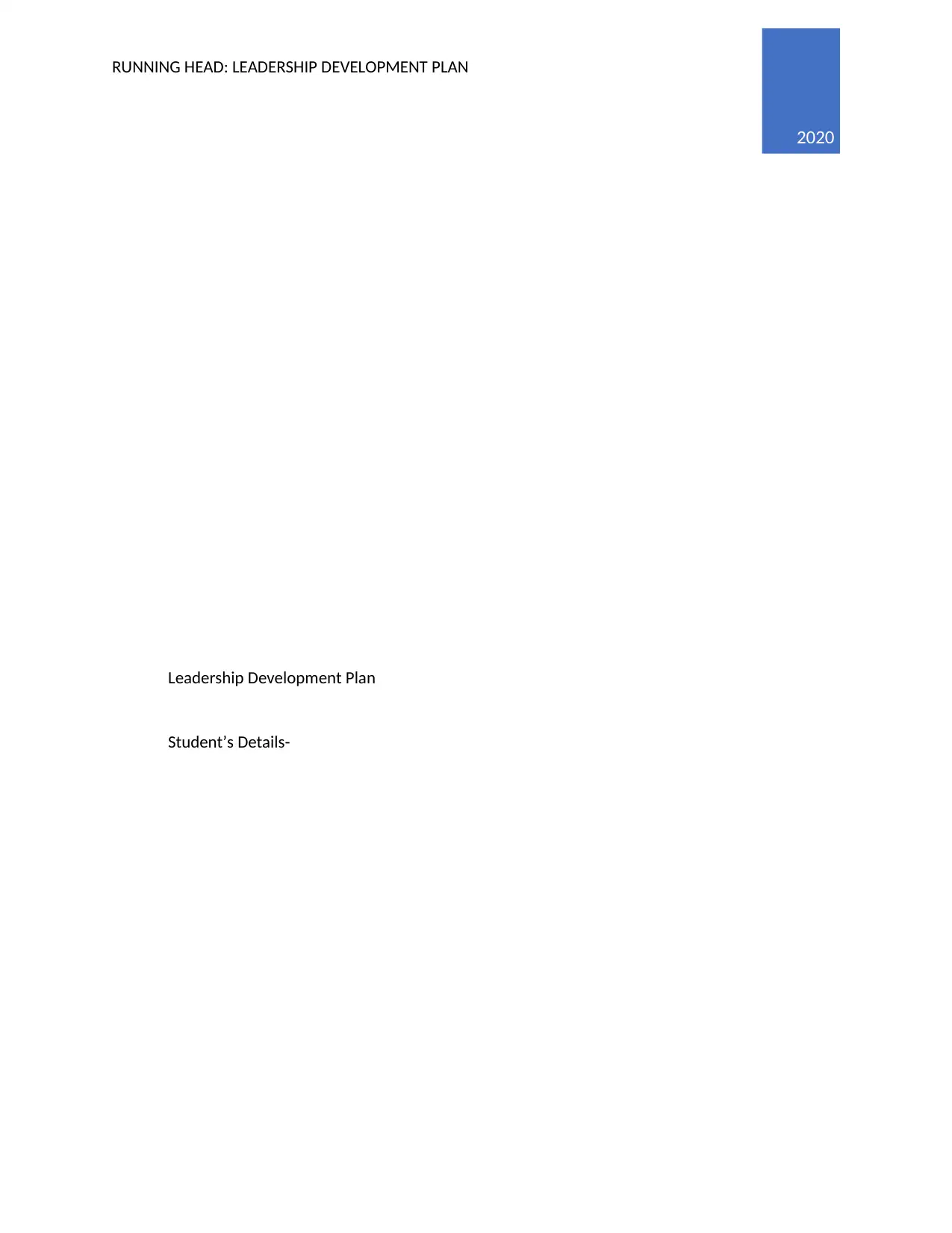
RUNNING HEAD: LEADERSHIP DEVELOPMENT PLAN 0
2020
Leadership Development Plan
Student’s Details-
2020
Leadership Development Plan
Student’s Details-
Paraphrase This Document
Need a fresh take? Get an instant paraphrase of this document with our AI Paraphraser
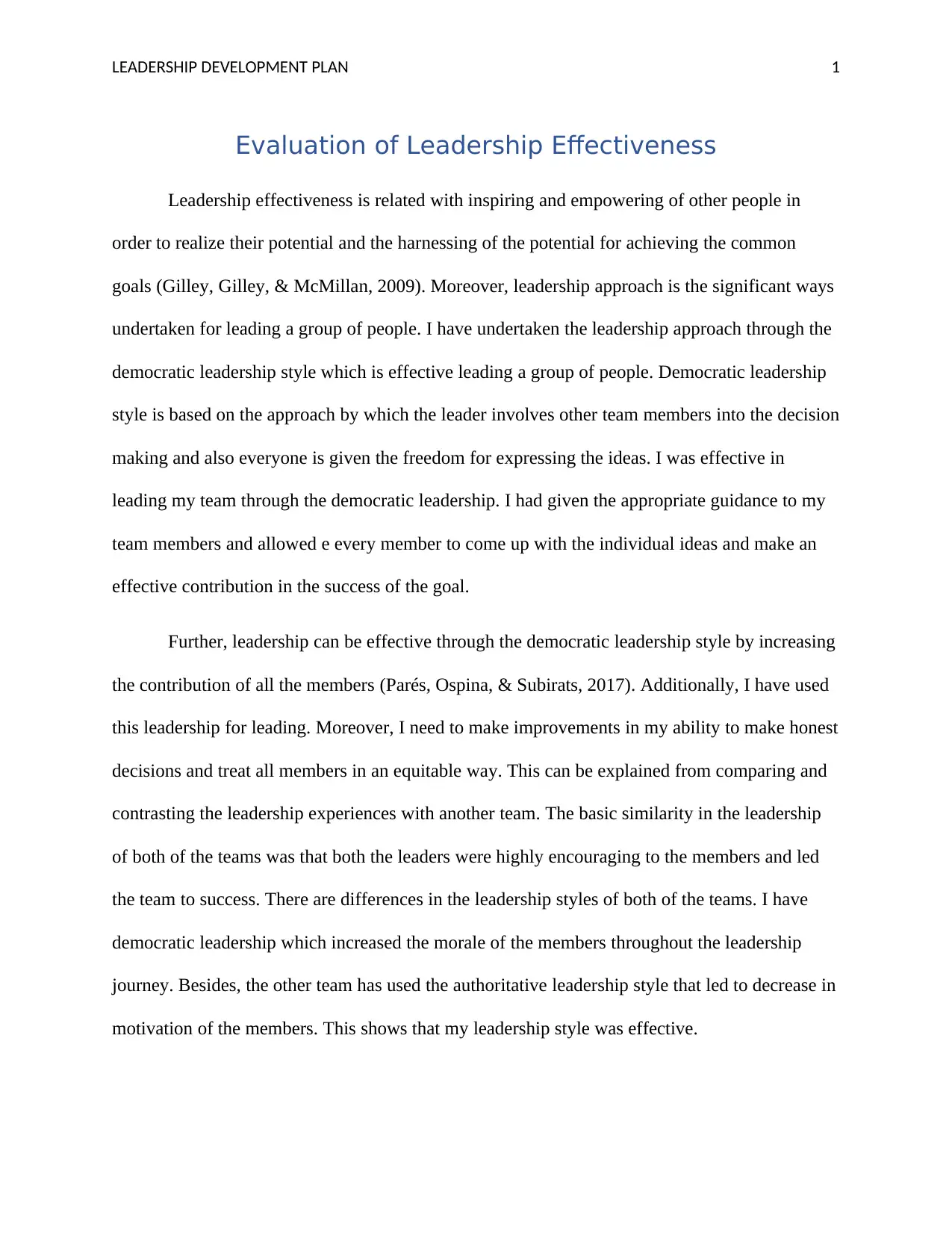
LEADERSHIP DEVELOPMENT PLAN 1
Evaluation of Leadership Effectiveness
Leadership effectiveness is related with inspiring and empowering of other people in
order to realize their potential and the harnessing of the potential for achieving the common
goals (Gilley, Gilley, & McMillan, 2009). Moreover, leadership approach is the significant ways
undertaken for leading a group of people. I have undertaken the leadership approach through the
democratic leadership style which is effective leading a group of people. Democratic leadership
style is based on the approach by which the leader involves other team members into the decision
making and also everyone is given the freedom for expressing the ideas. I was effective in
leading my team through the democratic leadership. I had given the appropriate guidance to my
team members and allowed e every member to come up with the individual ideas and make an
effective contribution in the success of the goal.
Further, leadership can be effective through the democratic leadership style by increasing
the contribution of all the members (Parés, Ospina, & Subirats, 2017). Additionally, I have used
this leadership for leading. Moreover, I need to make improvements in my ability to make honest
decisions and treat all members in an equitable way. This can be explained from comparing and
contrasting the leadership experiences with another team. The basic similarity in the leadership
of both of the teams was that both the leaders were highly encouraging to the members and led
the team to success. There are differences in the leadership styles of both of the teams. I have
democratic leadership which increased the morale of the members throughout the leadership
journey. Besides, the other team has used the authoritative leadership style that led to decrease in
motivation of the members. This shows that my leadership style was effective.
Evaluation of Leadership Effectiveness
Leadership effectiveness is related with inspiring and empowering of other people in
order to realize their potential and the harnessing of the potential for achieving the common
goals (Gilley, Gilley, & McMillan, 2009). Moreover, leadership approach is the significant ways
undertaken for leading a group of people. I have undertaken the leadership approach through the
democratic leadership style which is effective leading a group of people. Democratic leadership
style is based on the approach by which the leader involves other team members into the decision
making and also everyone is given the freedom for expressing the ideas. I was effective in
leading my team through the democratic leadership. I had given the appropriate guidance to my
team members and allowed e every member to come up with the individual ideas and make an
effective contribution in the success of the goal.
Further, leadership can be effective through the democratic leadership style by increasing
the contribution of all the members (Parés, Ospina, & Subirats, 2017). Additionally, I have used
this leadership for leading. Moreover, I need to make improvements in my ability to make honest
decisions and treat all members in an equitable way. This can be explained from comparing and
contrasting the leadership experiences with another team. The basic similarity in the leadership
of both of the teams was that both the leaders were highly encouraging to the members and led
the team to success. There are differences in the leadership styles of both of the teams. I have
democratic leadership which increased the morale of the members throughout the leadership
journey. Besides, the other team has used the authoritative leadership style that led to decrease in
motivation of the members. This shows that my leadership style was effective.
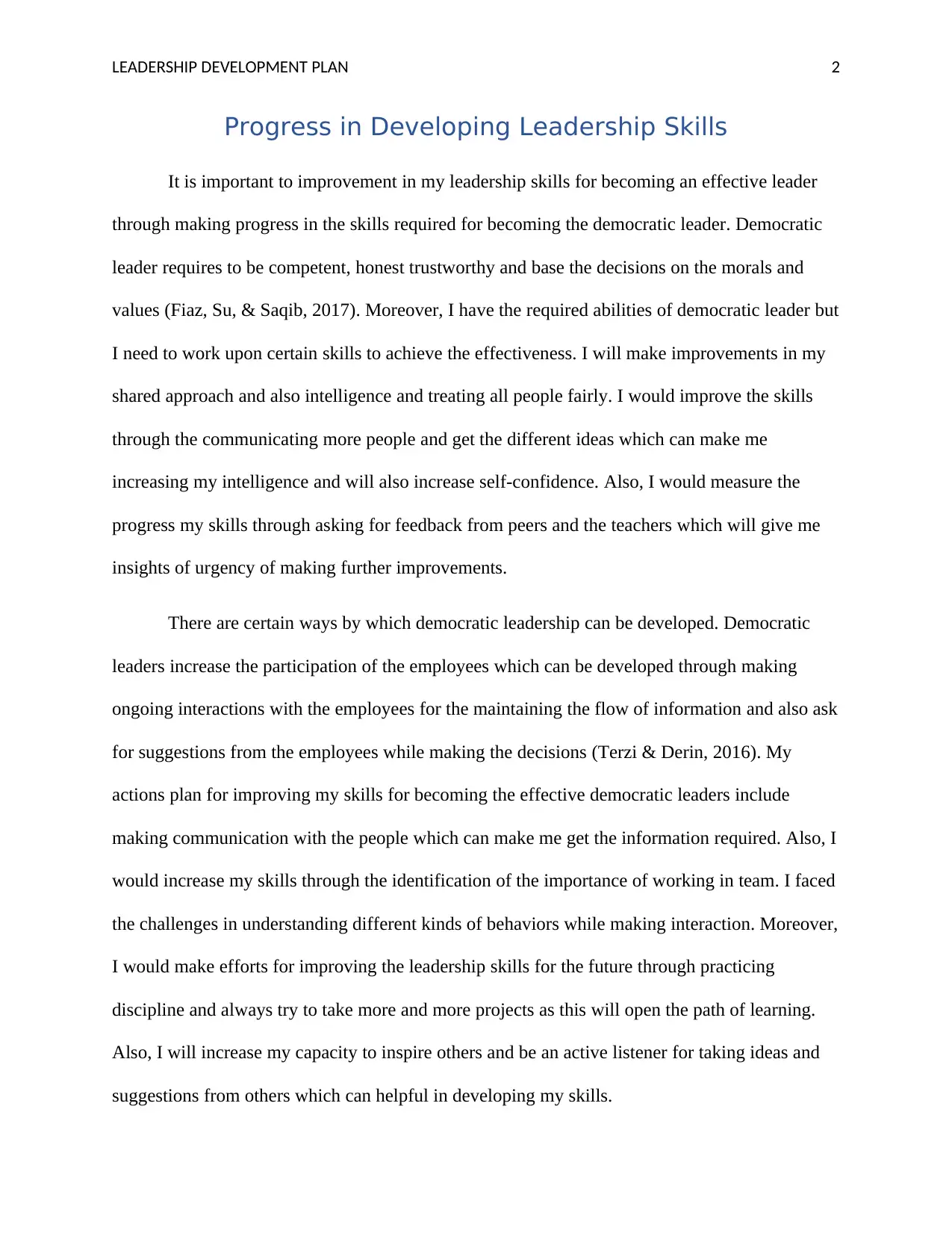
LEADERSHIP DEVELOPMENT PLAN 2
Progress in Developing Leadership Skills
It is important to improvement in my leadership skills for becoming an effective leader
through making progress in the skills required for becoming the democratic leader. Democratic
leader requires to be competent, honest trustworthy and base the decisions on the morals and
values (Fiaz, Su, & Saqib, 2017). Moreover, I have the required abilities of democratic leader but
I need to work upon certain skills to achieve the effectiveness. I will make improvements in my
shared approach and also intelligence and treating all people fairly. I would improve the skills
through the communicating more people and get the different ideas which can make me
increasing my intelligence and will also increase self-confidence. Also, I would measure the
progress my skills through asking for feedback from peers and the teachers which will give me
insights of urgency of making further improvements.
There are certain ways by which democratic leadership can be developed. Democratic
leaders increase the participation of the employees which can be developed through making
ongoing interactions with the employees for the maintaining the flow of information and also ask
for suggestions from the employees while making the decisions (Terzi & Derin, 2016). My
actions plan for improving my skills for becoming the effective democratic leaders include
making communication with the people which can make me get the information required. Also, I
would increase my skills through the identification of the importance of working in team. I faced
the challenges in understanding different kinds of behaviors while making interaction. Moreover,
I would make efforts for improving the leadership skills for the future through practicing
discipline and always try to take more and more projects as this will open the path of learning.
Also, I will increase my capacity to inspire others and be an active listener for taking ideas and
suggestions from others which can helpful in developing my skills.
Progress in Developing Leadership Skills
It is important to improvement in my leadership skills for becoming an effective leader
through making progress in the skills required for becoming the democratic leader. Democratic
leader requires to be competent, honest trustworthy and base the decisions on the morals and
values (Fiaz, Su, & Saqib, 2017). Moreover, I have the required abilities of democratic leader but
I need to work upon certain skills to achieve the effectiveness. I will make improvements in my
shared approach and also intelligence and treating all people fairly. I would improve the skills
through the communicating more people and get the different ideas which can make me
increasing my intelligence and will also increase self-confidence. Also, I would measure the
progress my skills through asking for feedback from peers and the teachers which will give me
insights of urgency of making further improvements.
There are certain ways by which democratic leadership can be developed. Democratic
leaders increase the participation of the employees which can be developed through making
ongoing interactions with the employees for the maintaining the flow of information and also ask
for suggestions from the employees while making the decisions (Terzi & Derin, 2016). My
actions plan for improving my skills for becoming the effective democratic leaders include
making communication with the people which can make me get the information required. Also, I
would increase my skills through the identification of the importance of working in team. I faced
the challenges in understanding different kinds of behaviors while making interaction. Moreover,
I would make efforts for improving the leadership skills for the future through practicing
discipline and always try to take more and more projects as this will open the path of learning.
Also, I will increase my capacity to inspire others and be an active listener for taking ideas and
suggestions from others which can helpful in developing my skills.
⊘ This is a preview!⊘
Do you want full access?
Subscribe today to unlock all pages.

Trusted by 1+ million students worldwide
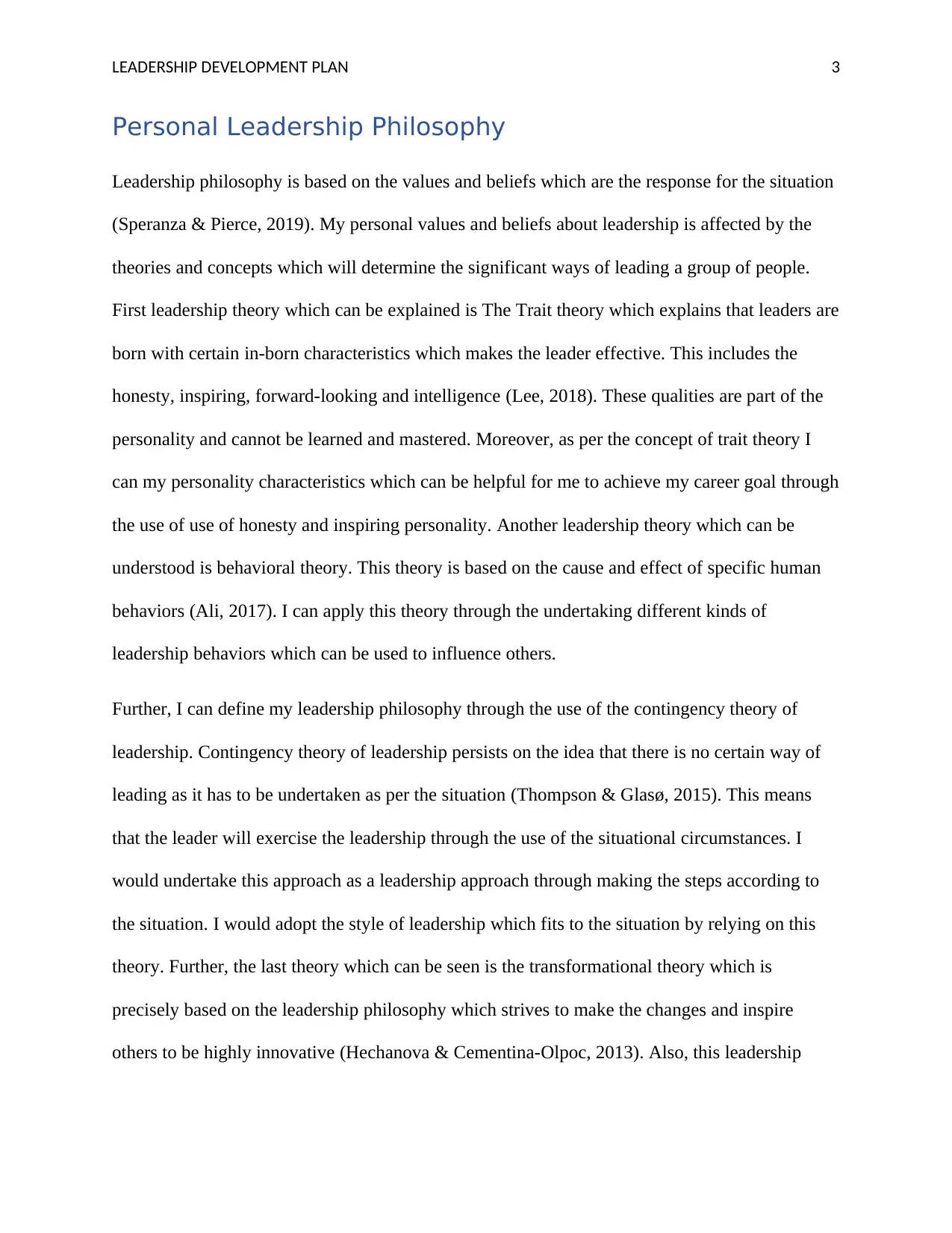
LEADERSHIP DEVELOPMENT PLAN 3
Personal Leadership Philosophy
Leadership philosophy is based on the values and beliefs which are the response for the situation
(Speranza & Pierce, 2019). My personal values and beliefs about leadership is affected by the
theories and concepts which will determine the significant ways of leading a group of people.
First leadership theory which can be explained is The Trait theory which explains that leaders are
born with certain in-born characteristics which makes the leader effective. This includes the
honesty, inspiring, forward-looking and intelligence (Lee, 2018). These qualities are part of the
personality and cannot be learned and mastered. Moreover, as per the concept of trait theory I
can my personality characteristics which can be helpful for me to achieve my career goal through
the use of use of honesty and inspiring personality. Another leadership theory which can be
understood is behavioral theory. This theory is based on the cause and effect of specific human
behaviors (Ali, 2017). I can apply this theory through the undertaking different kinds of
leadership behaviors which can be used to influence others.
Further, I can define my leadership philosophy through the use of the contingency theory of
leadership. Contingency theory of leadership persists on the idea that there is no certain way of
leading as it has to be undertaken as per the situation (Thompson & Glasø, 2015). This means
that the leader will exercise the leadership through the use of the situational circumstances. I
would undertake this approach as a leadership approach through making the steps according to
the situation. I would adopt the style of leadership which fits to the situation by relying on this
theory. Further, the last theory which can be seen is the transformational theory which is
precisely based on the leadership philosophy which strives to make the changes and inspire
others to be highly innovative (Hechanova & Cementina-Olpoc, 2013). Also, this leadership
Personal Leadership Philosophy
Leadership philosophy is based on the values and beliefs which are the response for the situation
(Speranza & Pierce, 2019). My personal values and beliefs about leadership is affected by the
theories and concepts which will determine the significant ways of leading a group of people.
First leadership theory which can be explained is The Trait theory which explains that leaders are
born with certain in-born characteristics which makes the leader effective. This includes the
honesty, inspiring, forward-looking and intelligence (Lee, 2018). These qualities are part of the
personality and cannot be learned and mastered. Moreover, as per the concept of trait theory I
can my personality characteristics which can be helpful for me to achieve my career goal through
the use of use of honesty and inspiring personality. Another leadership theory which can be
understood is behavioral theory. This theory is based on the cause and effect of specific human
behaviors (Ali, 2017). I can apply this theory through the undertaking different kinds of
leadership behaviors which can be used to influence others.
Further, I can define my leadership philosophy through the use of the contingency theory of
leadership. Contingency theory of leadership persists on the idea that there is no certain way of
leading as it has to be undertaken as per the situation (Thompson & Glasø, 2015). This means
that the leader will exercise the leadership through the use of the situational circumstances. I
would undertake this approach as a leadership approach through making the steps according to
the situation. I would adopt the style of leadership which fits to the situation by relying on this
theory. Further, the last theory which can be seen is the transformational theory which is
precisely based on the leadership philosophy which strives to make the changes and inspire
others to be highly innovative (Hechanova & Cementina-Olpoc, 2013). Also, this leadership
Paraphrase This Document
Need a fresh take? Get an instant paraphrase of this document with our AI Paraphraser
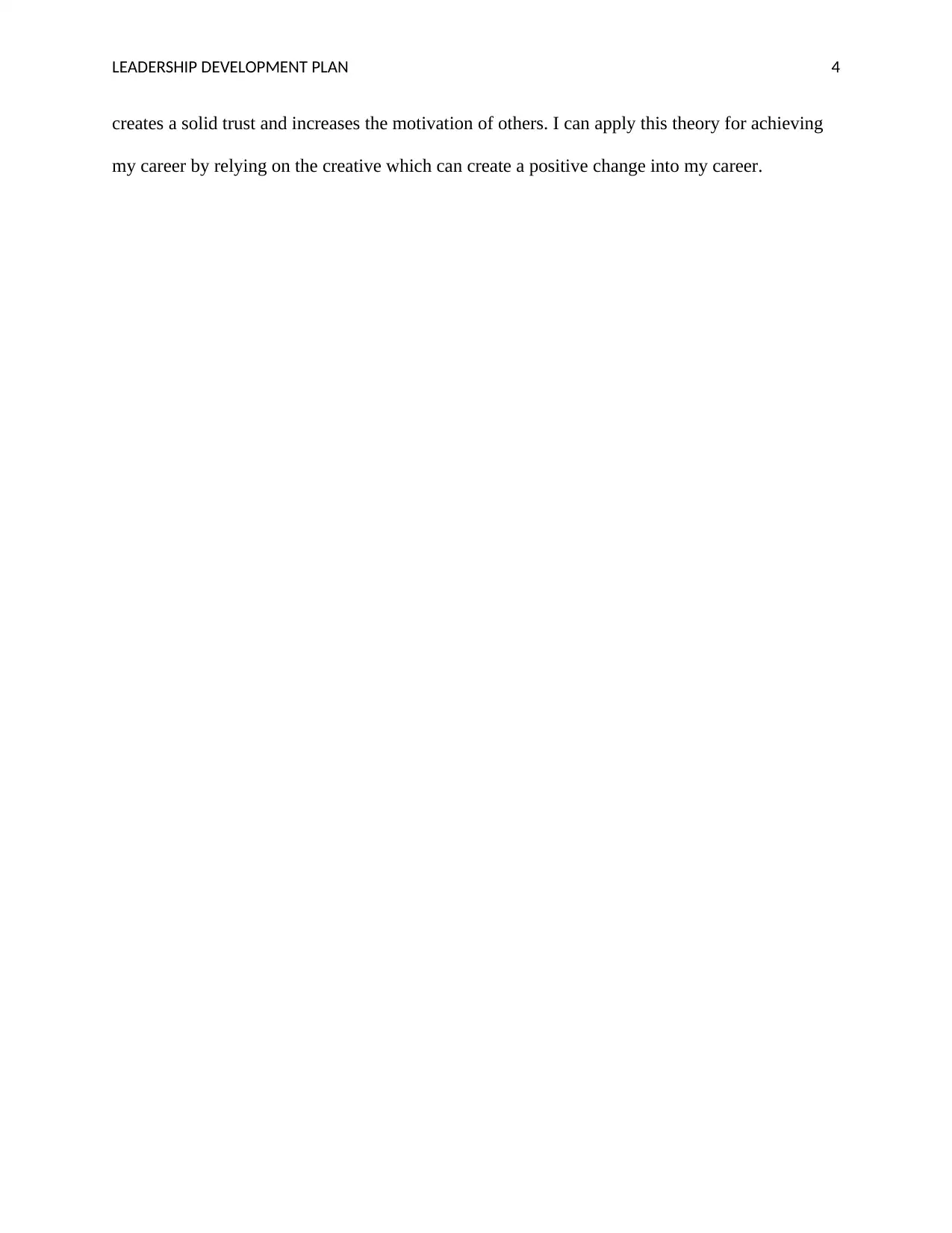
LEADERSHIP DEVELOPMENT PLAN 4
creates a solid trust and increases the motivation of others. I can apply this theory for achieving
my career by relying on the creative which can create a positive change into my career.
creates a solid trust and increases the motivation of others. I can apply this theory for achieving
my career by relying on the creative which can create a positive change into my career.
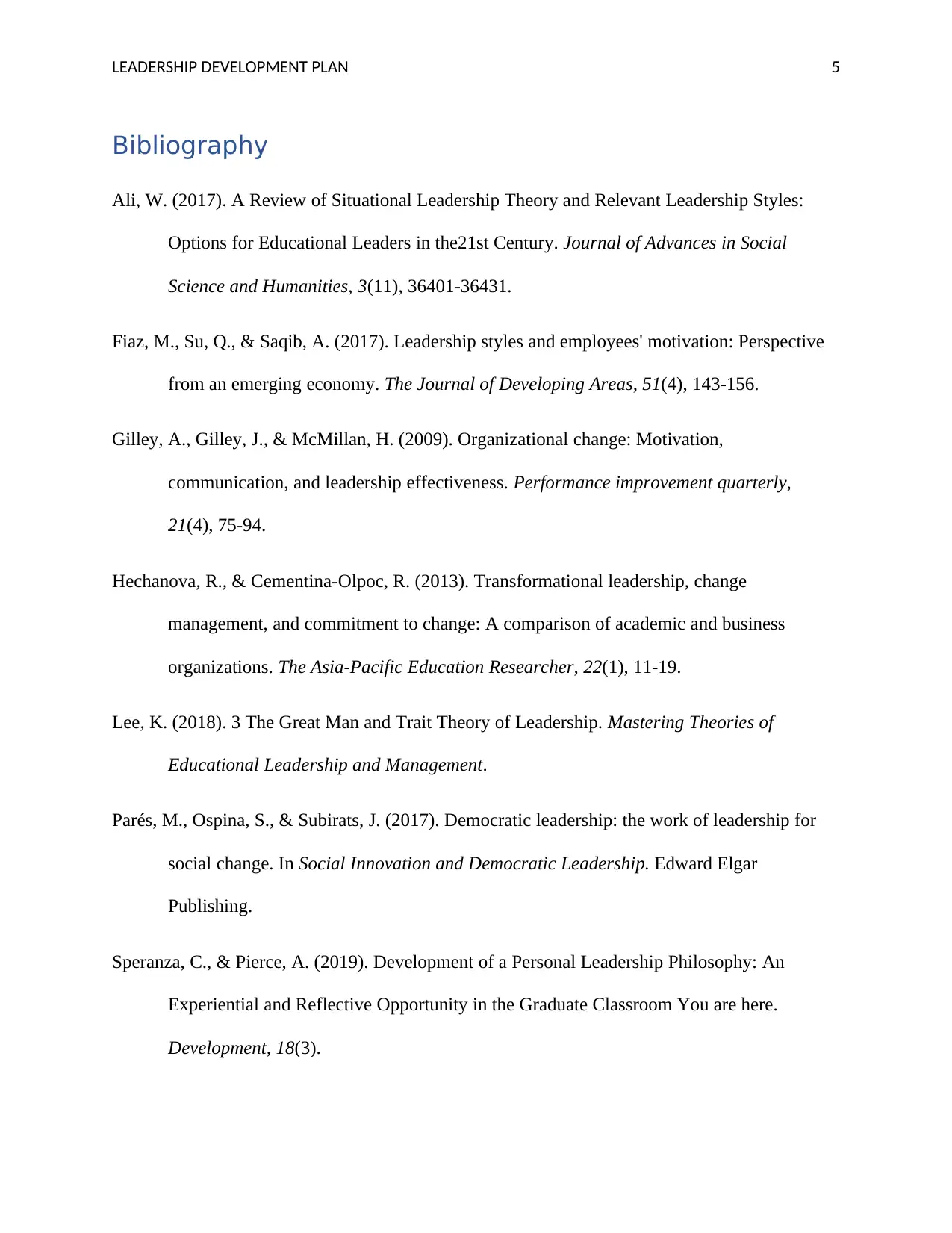
LEADERSHIP DEVELOPMENT PLAN 5
Bibliography
Ali, W. (2017). A Review of Situational Leadership Theory and Relevant Leadership Styles:
Options for Educational Leaders in the21st Century. Journal of Advances in Social
Science and Humanities, 3(11), 36401-36431.
Fiaz, M., Su, Q., & Saqib, A. (2017). Leadership styles and employees' motivation: Perspective
from an emerging economy. The Journal of Developing Areas, 51(4), 143-156.
Gilley, A., Gilley, J., & McMillan, H. (2009). Organizational change: Motivation,
communication, and leadership effectiveness. Performance improvement quarterly,
21(4), 75-94.
Hechanova, R., & Cementina-Olpoc, R. (2013). Transformational leadership, change
management, and commitment to change: A comparison of academic and business
organizations. The Asia-Pacific Education Researcher, 22(1), 11-19.
Lee, K. (2018). 3 The Great Man and Trait Theory of Leadership. Mastering Theories of
Educational Leadership and Management.
Parés, M., Ospina, S., & Subirats, J. (2017). Democratic leadership: the work of leadership for
social change. In Social Innovation and Democratic Leadership. Edward Elgar
Publishing.
Speranza, C., & Pierce, A. (2019). Development of a Personal Leadership Philosophy: An
Experiential and Reflective Opportunity in the Graduate Classroom You are here.
Development, 18(3).
Bibliography
Ali, W. (2017). A Review of Situational Leadership Theory and Relevant Leadership Styles:
Options for Educational Leaders in the21st Century. Journal of Advances in Social
Science and Humanities, 3(11), 36401-36431.
Fiaz, M., Su, Q., & Saqib, A. (2017). Leadership styles and employees' motivation: Perspective
from an emerging economy. The Journal of Developing Areas, 51(4), 143-156.
Gilley, A., Gilley, J., & McMillan, H. (2009). Organizational change: Motivation,
communication, and leadership effectiveness. Performance improvement quarterly,
21(4), 75-94.
Hechanova, R., & Cementina-Olpoc, R. (2013). Transformational leadership, change
management, and commitment to change: A comparison of academic and business
organizations. The Asia-Pacific Education Researcher, 22(1), 11-19.
Lee, K. (2018). 3 The Great Man and Trait Theory of Leadership. Mastering Theories of
Educational Leadership and Management.
Parés, M., Ospina, S., & Subirats, J. (2017). Democratic leadership: the work of leadership for
social change. In Social Innovation and Democratic Leadership. Edward Elgar
Publishing.
Speranza, C., & Pierce, A. (2019). Development of a Personal Leadership Philosophy: An
Experiential and Reflective Opportunity in the Graduate Classroom You are here.
Development, 18(3).
⊘ This is a preview!⊘
Do you want full access?
Subscribe today to unlock all pages.

Trusted by 1+ million students worldwide
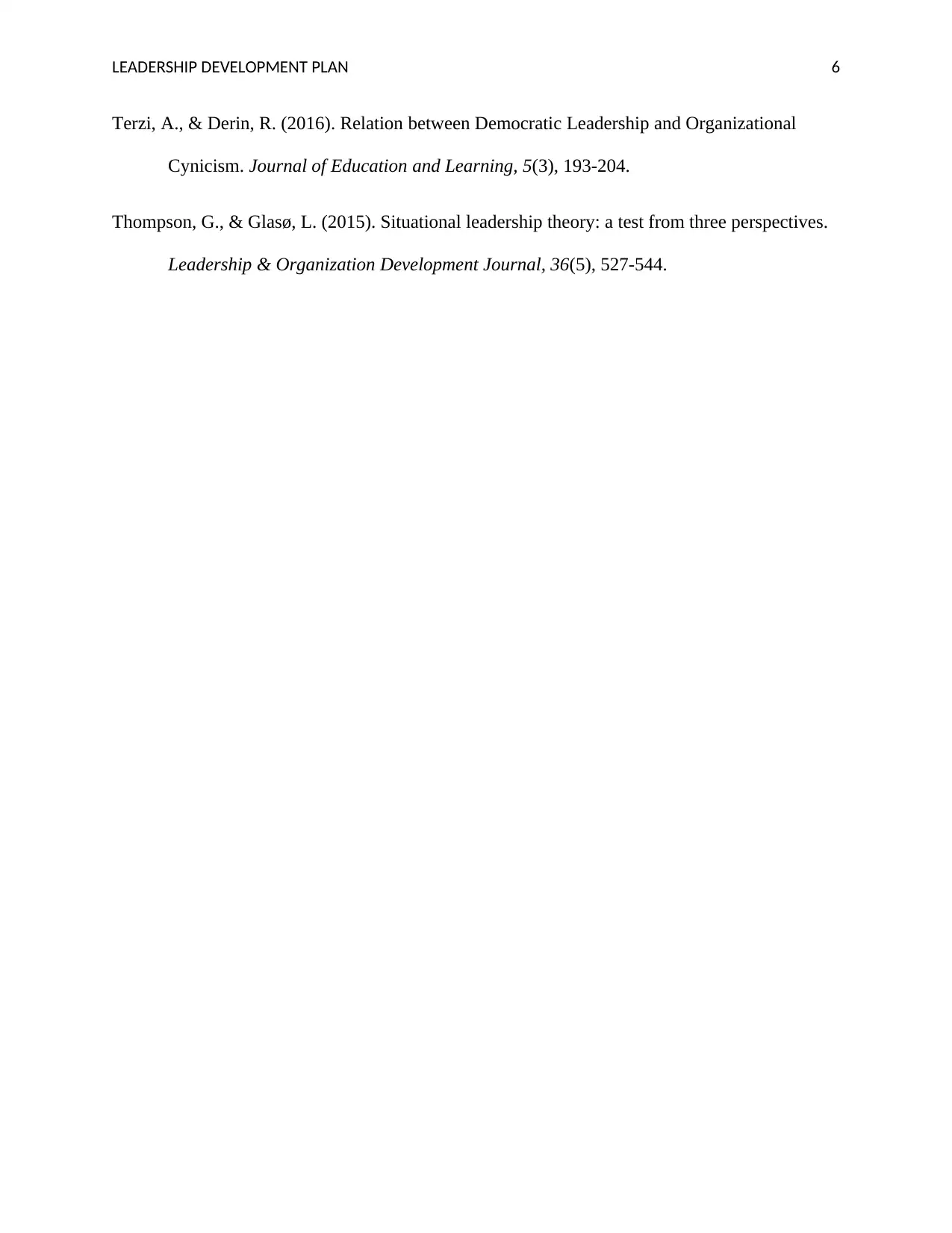
LEADERSHIP DEVELOPMENT PLAN 6
Terzi, A., & Derin, R. (2016). Relation between Democratic Leadership and Organizational
Cynicism. Journal of Education and Learning, 5(3), 193-204.
Thompson, G., & Glasø, L. (2015). Situational leadership theory: a test from three perspectives.
Leadership & Organization Development Journal, 36(5), 527-544.
Terzi, A., & Derin, R. (2016). Relation between Democratic Leadership and Organizational
Cynicism. Journal of Education and Learning, 5(3), 193-204.
Thompson, G., & Glasø, L. (2015). Situational leadership theory: a test from three perspectives.
Leadership & Organization Development Journal, 36(5), 527-544.
1 out of 7
Related Documents
Your All-in-One AI-Powered Toolkit for Academic Success.
+13062052269
info@desklib.com
Available 24*7 on WhatsApp / Email
![[object Object]](/_next/static/media/star-bottom.7253800d.svg)
Unlock your academic potential
Copyright © 2020–2026 A2Z Services. All Rights Reserved. Developed and managed by ZUCOL.




![Leadership Development Action Plan - [University Name] - [Semester]](/_next/image/?url=https%3A%2F%2Fdesklib.com%2Fmedia%2Fimages%2Fex%2Fca941d1709ed4555af6e8d6457548699.jpg&w=256&q=75)
